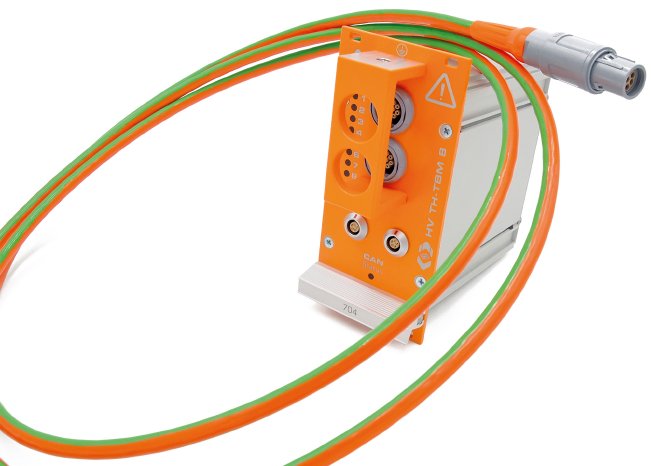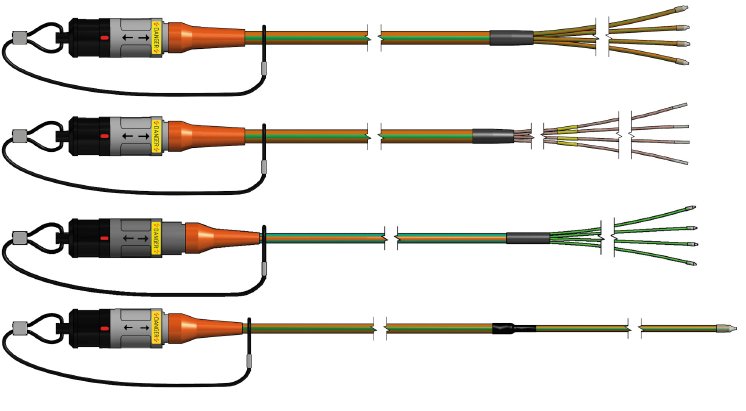The growing importance of electric drive technology brings with it the need for reliable high-voltage (HV) measurement to ensure the operational safety of on-board electrical systems and charging infrastructure. In addition to special cables for HV wiring, two German manufacturers, SAB Bröckskes and CSM, have been developing measurement modules for the safe testing of HV components in vehicles and on test benches for a good 10 years.
Image 1: SAB connection cable for a high-voltage (HV) measurement module for temperature and analogue measurement signals
Today’s electric vehicles feature extensive HV networks with a voltage of several hundred volts connecting the various electrical equipment. In addition to the battery and the inverter for controlling the three-phase machines, networked components also include smaller loads such as a DC/DC converter, battery cooling, heat pump and vehicle heating. To ensure operational safety, safe measurement solutions are required for high DC and AC voltages as well as all relevant physical parameters from temperature and acceleration to force and pressure. The scope and complexity of testing are increasing because the HV infrastructure in the high-end vehicle range includes more and more comfort features, and heavy premium-range cars usually have several powerful electric motors.
Special cables for high-voltage measurements
For about a decade, the special cable manufacturer SAB Bröckskes has been developing and producing HV cables for electric mobility, with dedicated measurement cables for temperature, voltage, acceleration and strain gauges. The company also manufactures shielded and unshielded individual wires for voltages up to 1.8/3 kV for cabling in test benches or laboratories, for example to connect control cabinets or battery test systems. The portfolio includes connection cables for accelerometers (IEPE) and strain gauges to measure acceleration and mechanical voltage in HV environments, HV measurement cables for DC and AC voltage, and highly flexible HV cables for temperature measurement. In addition, the company’s portfolio includes single- and multi-channel type-K HV sensors, HV Pt100/Pt1000 sensors and HV test adapters. Type-K HV sensors are rugged probes that are ideally suited for precise temperature measurement on inverters, electric motors, HV batteries and power electronics. For high process temperatures as occur during thermal curing of insulation materials in electrical aggregates and other HV components, SAB Bröckskes offers designs that withstand ambient temperatures up to 200 °C. The range is rounded off by PT100/1000 HV resistance sensors, which are ideal for high-precision measurements with low thermal mass and comparatively short response times due to their slim design and full-surface contact. The wide range of applications for this sensor type includes temperature detection between individual HV battery cells.
Image 2: PT100/PT1000 HV resistance sensors with extension cable for high-precision temperature measurements at low thermal mass
Modular measuring system
SAB Bröckskes and its technology partner CSM have introduced an HV measuring system consisting of measurement modules, temperature sensors and measuring cables for high-voltage e-mobility components. The system consisting of sensor cable, plug, socket and measuring module enables the use of uninsulated sensors up to 1000 V DC operating voltage. It is safety-attested according to DIN EN 61010 and designed for mobile use in electric and hybrid vehicles as well as stationary installations to measure current, voltage and power directly in HV lines. The system is equally suitable for HV measurements on electrified municipal vehicles as well as on mobile forestry, agricultural and construction machinery. SAB Bröckskes HV sensor cables – such as HV 2-channel analogue measuring cables (90 V), HV 4-channel voltage measurement cables (90 V) and 4-channel voltage measurement cables (1000 V) – ensure a reliable measurement chain from sensor to data acquisition. These also enable common low-voltage sensors to be integrated into HV applications. CSM has cooperated with the German automotive electronics specialist Vector Informatik to develop a scalable e-mobility measurement system for vehicles and test benches that enables data logging and measured value management in HV and LV environments. The decentralized measuring system enables, among other things, synchronous acquisition of measured data from measurement modules, vehicle buses and control units, direct measurement of current and voltage in HV lines with up to 1 MHz as well as multi-channel real-time power analysis.
Image 3: Type-K HV sensors for reliable temperature measurement on HV components such as inverters, electric motors, HV batteries and power electronics
Multi-level protection
A multi-level safety concept in accordance with the provisions of DIN EN 61010 for electrical measuring, control and laboratory equipment ensures safe HV measurement. An isolation barrier in the measurement module ensures secure transmission of measured data and safe power supply. All SAB sensor cables feature multi-layered insulation to protect against electric shock. A blue intermediate insulation, which acts as a wear indicator, signals damage to the cable sheath. The especially developed HV connector for the sensor cable is plugged into the HV module socket through a kink-protection sleeve. HV plug and HV socket are designed to be touch-proof. Before shipping, each individual measuring module undergoes testing in accordance with DIN EN 61010, which is documented in a test report. An accredited test laboratory carries out type tests of the entire system consisting of measurement modules and signal cables. In further test procedures, the units are tested for EMC, shock and vibration resistance as well as their degree of protection of IP65 or IP67. In addition, CSM recommends that HVI isolation tests be carried out annually, if possible, as the modules can be damaged by high temperatures or severe mechanical stress. CSM offers these tests as a service or supplies the test technology developed inhouse to users with a high volume of tests for independent insulation testing.




